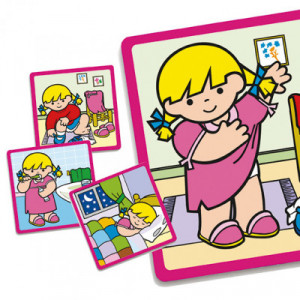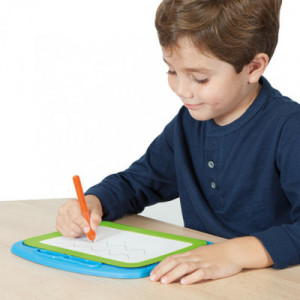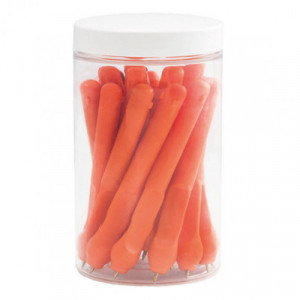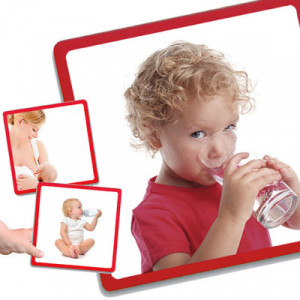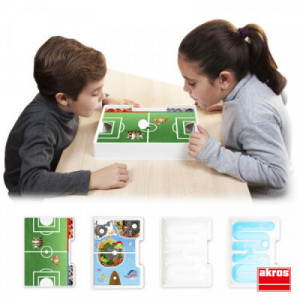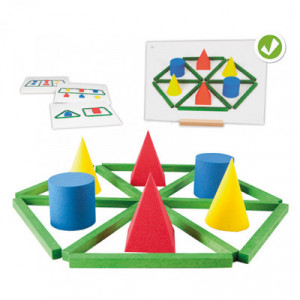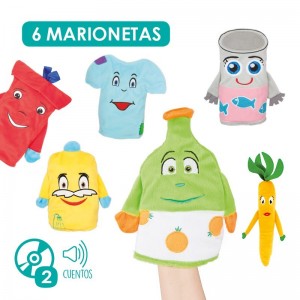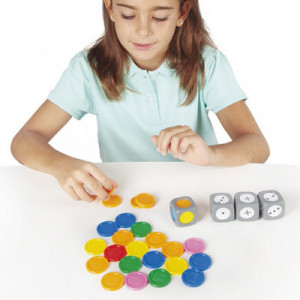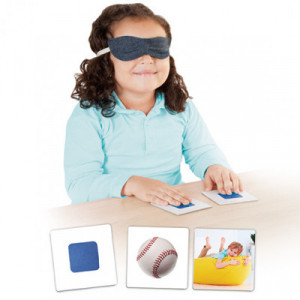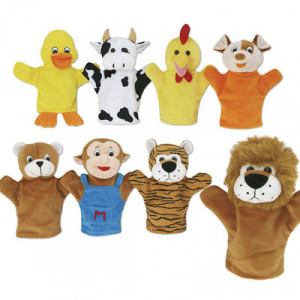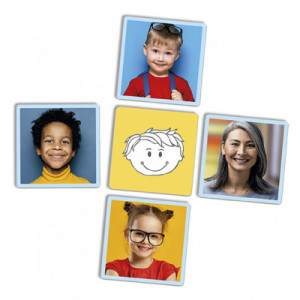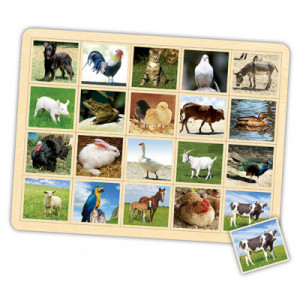Intellectual Disability and Down's Syndrome
A child with an intellectual disability learns and develops more slowly than other children. But this disability is not only related to the child, but its relationship with the environment is especially relevant. If we create inclusive environments, they will be able to develop many of their skills and capabilities and leverage all their strengths.
Games should be focused on developing autonomy, stimulating your senses, improving the expression of oral and written language.
They also work on muscle tone and motor skills and encourage their socialization with the environment. Enhancing your creativity and strengths through play is also essential.
This selection of games will help you choose the perfect gift.
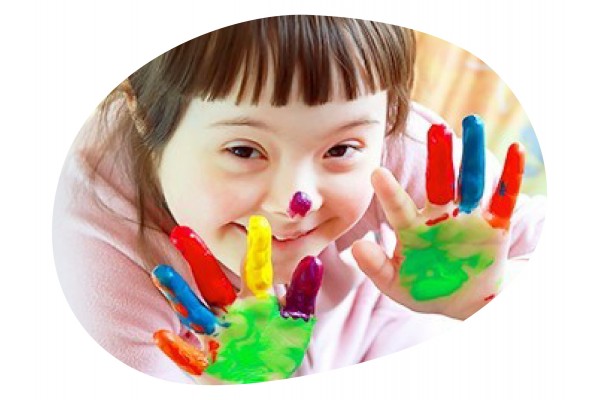
Games for children with Down Syndrome
Through play, children begin to mature their character, strengthen their health, learn to socialize and relate to their environment. Parents and educators of a child with Down syndrome can provide activities and toys to motivate the child in the process of self-awareness and personal growth.
Games to develop gross motor skills
Because of the hypotonic constitution of their bodies, the ideal games for children with Down syndrome are those that stimulate their motor skills. Outdoor games will strengthen your muscles, respiratory system and refine your visomotor coordination.
When the person with the syndrome is able to control their body, it's time for parents to motivate them with games that involve jumping and running. These activities, always beneficial to health, will help the child to improve coordination and balance. Swings should be used sparingly to prevent children from developing self-stimulating swinging movements.
Games to develop fine motor skills
The stimulation of fine motor skills is carried out through specific educational games. Precision motor skills require the strengthening of manual muscles and independent finger handling.
The games that allow this training are, among others:
- Games to fit objects in holes.
- Balls, cubes and figures to be threaded.
- Construction bucket toys.
- Games to draw with pencils, paints or waxes.
- Crafts with paper or molding paste.
- Dotted drawings with pre-writing punches.
Games to develop cognition
These games develop children's attention span and perception. When these skills are improved, children will be prepared to take on the learning of more complex skills. Games to train cognition include, but are not limited to:
- Puzzles of variable difficulty. From small board games and simple drawings to more complex illustrations.
- Association games, memory games and blocks with geometric shapes that must be coupled in logical order.
Games to develop creative capacity
The creativity of children with Down Syndrome is developed through language games. These activities stimulate children's ability to communicate. These activities include the following
- Stories with interactive CDs to read as a family.
- Story dice, or cards with story sequences.
- Letters with images of objects and actions.
- Puppets and costumes.
Specialty Toys for Down Syndrome
There are three important stages to consider when trying to motivate a child with Down Syndrome, and here is a list of the most recommended games for each of them:
First stage
We want to motivate your eyesight (help you follow objects and reach for them), draw your attention with vivid colors, and connect your sense of hearing to movement to promote an effective response. At this stage they are usually used:
- Balls and dice made of foam or different textures with vivid colors
- Long or short handle rattles, light in bright colors
- Unbreakable mirrors
- Mobiles with various figures
- Music Boxes
- Instruments such as the xylophone and the drum
- Vertical stick with rings
- Dolls that react when pushed
- Dolls that sound when pressed
Second stage
We seek to motivate their motor skills and manual agility with toys that in turn stimulate spatial understanding:
- Ring pyramids
- Locking or overlapping blocks
- Cylinders or cups stackable or snap-on
- Accounts to assemble
- Balls of different sizes and colors
- Floating toys for the bath
- Swing (baby bouncer)
Third stage
In the third stage, toys that stimulate logical thinking and reasoning begin to be introduced as we continue to stimulate manual agility and motor skills.
- Cubes of blocks to build
- Mailbox with holes that accept different shapes
- Balls, cars, dolls
- Push and pull toys
- Tricycle without pedals or corridors
- Stories with hard sheets and large, clear drawings
- Overlapping rings
- Perforated board to create patterns with coloured studs
- Trumpets and other instruments
- Edible paints
- Introduction to the food game
- Animals and other more sophisticated dolls
Sports and games for children with intellectual disabilities
Sport offers many benefits, not only for health, but also for social life: it promotes sociability, thanks to rules and team play, and stimulates complex perception mechanisms such as lateralization, muscle coordination and fine motor skills.
Better physical tone can increase the chances of self-care for children with intellectual disabilities, for whom this activity is crucial. In addition to rehabilitation and therapeutic value, it is very important from a social and emotional point of view.
Organizing activities for children with disabilities initially can seem like a complex task and you may even get discouraged. Some syndromes are very difficult to treat, but you don't have to give up. Action can always be taken to promote progress and development. Sport has not only a physical and social dimension, but also a cognitive dimension. Its playful character makes it a fun and enjoyable learning tool. Try to contact the various sports associations for people with disabilities in your area, and find out more about your child's exercise possibilities.
Toys from 3 years old for children with disabilities
Children with disabilities are still children, their tastes and needs are identical to those of any child and therefore they also love to play just like everyone else. They do not necessarily require special toys, although depending on the disability, a traditional toy or game may be required to be adapted to the child's characteristics. In addition, there are games and toys created exclusively to meet the needs of children in certain categories of disability. These kinds of toys transcend play itself, and have some therapeutic use to help sharpen a child's sensory and intellectual abilities.
Specific toys for intellectual and mental disabilities are based on stimulation. Children with mental or cognitive disabilities are often very curious about the world around them. Stimulating them through play is undoubtedly one of the best ways to help them gain autonomy and develop their skills. There are many \classic\" toys that children with mental disabilities can play with. Especially those that produce a multi-stimulation with lights and sounds with buttons and controls that the child can operate directly. Among them you can find different tactile games, toy books in cloth or soft plastic, and all those products that stimulate symbolic play through which to learn the gestures of everyday life.
Choosing the toy for a cognitively retarded child
In order to correctly choose a toy that is stimulating for a child with an intellectual disability, it is good to consult the package first about the age group for which the game was designed, and with this information it can be decided if it is appropriate according to the degree of the child's cognitive evolution. Children with disabilities should find play accessible in terms of handling, and should be able to play in positions that are comfortable for them. Akros games have been designed by professionals in the field of education and speech therapy, as intellectual disability is sometimes associated with speech disorders.
Children with language disorders are not only those who do not use words, but also all children who have a delay in language development. There is a whole range of educational toys dedicated to this disability, which aim to stimulate the use of voice and speech through fun and interesting games for the child. Some examples are cards that represent images and designs to match the corresponding word, interactive games to read aloud the written words, etc. These toys can also be used by all children who have a attention disorder and therefore tend to be hyperactive and devote little attention to a single toy.
Tips for playing with your children
To what extent should parents be involved in their children's play? Parents must satisfy their children's needs and desires for play, although it is not necessary to be a permanent animator, but rather to dedicate a few minutes a day and learn to use all the possibilities of play offered by everyday life. You should only consider the child's type of disability and grade when playing to tailor the fun to his or her abilities.
Younger children are easier to satisfy, because they don't care so much about the game itself, because they are more interested in the presence of parents. Parents can sit on the floor next to him and help him scribble or put together building blocks, following his inclinations. The minutes of daily dedication to the child should be for the child alone, without interruptions from work calls, etc. The important thing is to give clear rules to guide the children about the duration of the activity, and to understand that tomorrow they will play with the parents again.
On the use of everyday life, parents can invent games to enjoy with their children, for example, during a car trip, or shopping at the supermarket, or setting the table for lunch. These moments of fun for the child count, even though for you it's just another activity at home. As you can see, there is no excuse for not playing with the children on the grounds of lack of time, as daily life offers it to you.
Information about Down Syndrome
Trisomy 21 or Down syndrome is a genetic abnormality that often involves learning difficulties. The human being has 23 pairs of chromosomes; Les meilleurs jeux adaptés à la déficience intellectuelle et au syndrome de Down. Découvrez tout ici et achetez-les en ligne !

